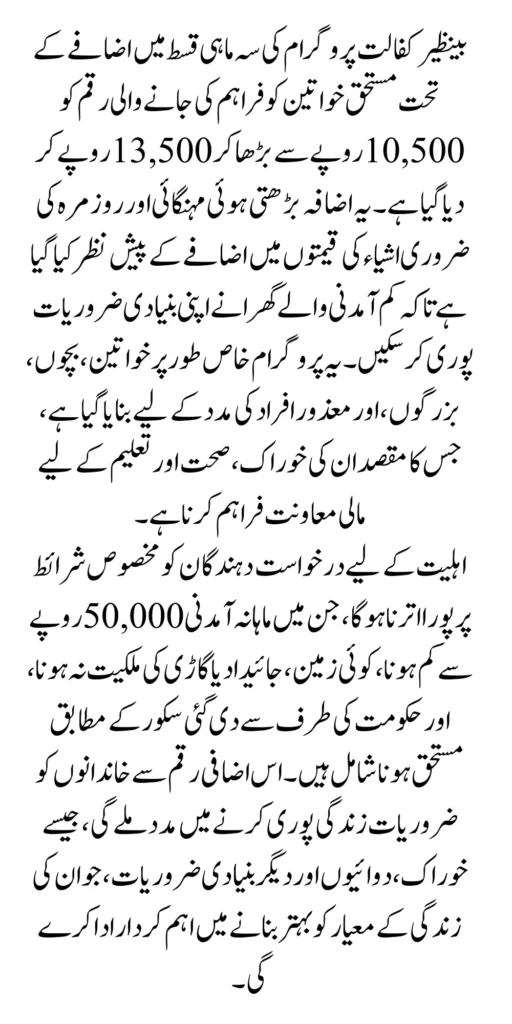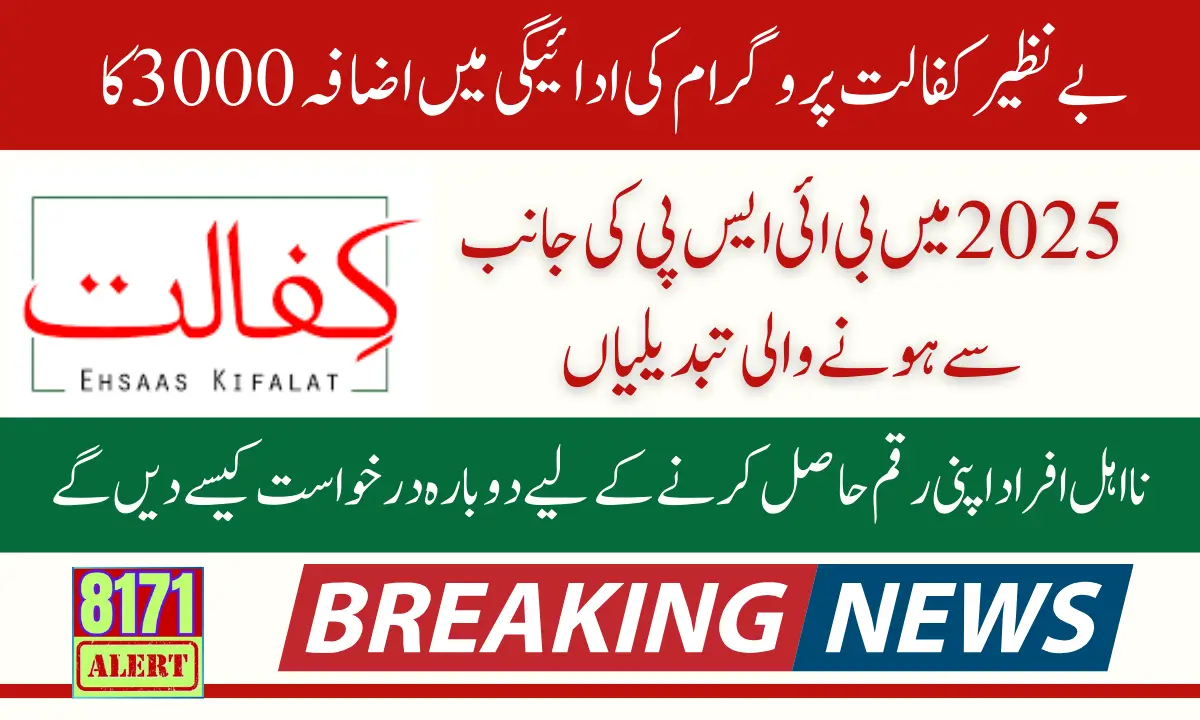Benazir Kafalat Quarterly Installment Increase
Benazir Kafalat Quarterly Installment Increase the quarterly payment for eligible beneficiaries has been increased from 10500 to 13500. This increase comes at a crucial time when rising inflation and the increasing cost of living have put additional strain on low-income households.
the eligibility criteria, and the potential impact on millions of families across the country. The payment in the Benazir Kafalat program has been increased to 3000. This payment will be given to those women who have completed the registration process. If you have also completed your registration completely, then you can easily get your payment. If you have reviewed your complete information, then after reviewing the information, you can easily get your payment. If you are eligible,
You Can Also Read: Benazir Kafalat Program Payment Details 2025
Benazir Kafalat Quarterly 13500
Its primary aim was to alleviate poverty by providing financial assistance to households living below the poverty line. Recognizing the large number of families struggling to meet basic needs, the government took steps to help bridge the gap through this welfare initiative.

The Kafalat Program specifically targets the most vulnerable groups in society, including women, children, elderly individuals, and those with disabilities. It is designed to provide direct financial aid to these groups, empowering them to meet their daily needs, such as food, healthcare, and education. The program has been crucial in improving the standard of living for millions of Pakistanis.
You Can Also Read: New Updates Ehsaas Program 8171 Web Portal 2025 Eligibility And Registration
Latest Update Payment Increase from 10500 to 13500
In 2025, the government has made a significant decision to increase the quarterly payment for eligible Benazir Kafalat beneficiaries. Previously, each beneficiary received 10,500 every three months. This amount has now been raised to 13500 a 3,000 increase.
This increase comes as a response to the growing inflation and the rising cost of essential goods and services in Pakistan. Over the years, prices for things like food, fuel, and basic commodities have increased drastically, making it more challenging for low-income families to make ends meet. By increasing the payment, the government aims to help these families maintain their purchasing power and meet their basic needs.
You Can Also Read: BISP 8171 Result Check Online By CNIC Through 8171 Web Portal
Why Was the Payment Increased?
Inflation in Pakistan has been a constant issue, putting pressure on families with limited financial resources. As prices of food, fuel, and other essentials continue to rise, it becomes harder for low-income households to keep up with their expenses. This increase in the quarterly payment was necessary to offset the growing costs of living and provide families with a little more breathing room.
By raising the payment, the government aims to ensure that Benazir Kafalat recipients have the means to buy necessities like food, medicines, and clothing without compromising their well-being. It is a direct effort to maintain the financial security of the most vulnerable segments of society.
You Can Also Read: BISP Ineligibility Registration 13500 For Ineligible Women
Eligibility Criteria for the Increased Payment
Not everyone is eligible to receive the increased payment of 13,500. To qualify, individuals must meet certain conditions outlined by the program. Here’s what you need to know:
- Your monthly household income should be less than 50,000.
- Your PMT score must be 34% or lower. This score is used to assess the economic status of families and determine eligibility.
- Applicants should not possess a passport and should not have traveled abroad.
- You must not own land, business, or property in your name.
- You must not have any vehicle registered under your name.
- You must be a resident of Pakistan.
- You cannot be employed in a government job.
If you meet all these conditions, you will be eligible to receive the increased quarterly installment of 13,500.
You Can Also Read: Benazir Kafalat 13500 Payment Through CNIC For Registered And Eligible
How the Payment Increase Helps Families
For many families, the increase in Benazir Kafalat payments will be a lifeline. With the rising costs of food, healthcare, and other essentials, the additional 3000 per quarter will go a long way in improving the quality of life for vulnerable households. Beneficiaries will find it easier to provide basic needs for their families, ensuring that they don’t have to make difficult choices between essentials like food and medicine.
You Can Also Read: Benazir Kafalat 13500 Payment Through CNIC For Registered And Eligible
Increased Financial Security
The added financial support helps ensure that vulnerable families have a safety net, especially during times of economic hardship. With the increase, recipients can feel more secure in their ability to meet their daily needs without constant worry about inflation or price hikes. It also gives recipients the freedom to use the funds for important areas like healthcare or education, further supporting the overall well-being of their families.
Benazir Kafalat Program 13500 In 2025
While the increase in the quarterly installment is a positive change, there’s a broader need for sustainable economic solutions. The government must continue to monitor the Benazir Kafalat Program to ensure that it meets the evolving needs of the population, especially with inflation continuing to affect the economy.
In the long term, Pakistan’s social protection system should focus not only on providing immediate financial relief but also on addressing the root causes of poverty. This includes tackling issues like unemployment, low wages, and lack of educational opportunities. Long-term strategies should be put in place to create sustainable livelihoods for all.
Final Thoughts
The Benazir Kafalat Program has been a vital resource for millions of low-income families across Pakistan, offering much-needed financial support. The increase in the quarterly payment from 10,500 to 13,500 in 2025 is a welcome development that reflects the government’s commitment to improving the lives of its citizens. However, as inflation continues to rise, it’s important that the government remains vigilant and responsive to the changing needs of its population.
By ensuring that the Benazir Kafalat Program evolves alongside economic challenges, the government can continue to provide vital support to the most vulnerable and help lift them out of poverty. The ultimate goal should be to create sustainable economic growth and inclusive opportunities for all Pakistanis.
Frequently Asked Questions
What is the Benazir Kafalat Program?
The Benazir Kafalat Program is a government initiative designed to provide financial assistance to low-income families in Pakistan. It helps beneficiaries meet basic needs like food, healthcare, and education.
Why was the Benazir Kafalat payment increased from 10,500 to 13,500 in 2025?
The payment increase was made in response to rising inflation and the increasing cost of living, aiming to help vulnerable families maintain their purchasing power and meet daily expenses.
What are the eligibility criteria for the new 13,500 payment?
To qualify, individuals must have a monthly income under 50000 meet the PMT score criteria, and not own assets like land, property, or vehicles.
How does the increase in BISP payments benefit families?
The increased payment helps families cope with the rising cost of living, providing better access to food, healthcare, and education, ultimately improving their standard of living.
What long-term strategies are needed beyond the payment increase?
The government should focus on creating sustainable economic opportunities, improving education and healthcare systems, and addressing root causes of poverty such as unemployment and low wages.

